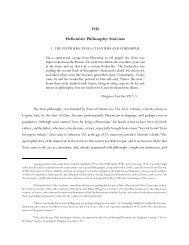Bibliography for Ancient Greek Philosophy - UW-Parkside: Help for ...
Bibliography for Ancient Greek Philosophy - UW-Parkside: Help for ...
Bibliography for Ancient Greek Philosophy - UW-Parkside: Help for ...
Create successful ePaper yourself
Turn your PDF publications into a flip-book with our unique Google optimized e-Paper software.
Nock, A.D. (1959). Journal of Roman Studies 49: 1 ff. On Posidonius.<br />
+Nussbaum, Martha (1994). The Therapy of Desire. Princeton University Press. An excellent treatment of the religious/therapeutic<br />
side of Hellenistic thought.<br />
Pohlenz, M. (1948). Die Stoa. Göttingen:Vandenhoeck &Ruprecht. The best treatment, with no parallel in English.<br />
Reesor, M.E. (1954). “The Stoic concept of quality.” American Journal of Philology 75: 40–58.<br />
________ (1957). “The Stoic categories.” American Journal of Philology 78: 63–82.<br />
________ (1965). “Fate and possibility in early Stoic philosophy.” Phoenix 19: 285–97.<br />
Rist, ed. The Stoics.<br />
Robins, H.R. (1951). <strong>Ancient</strong> and Medieval Grammatical Theory. London. See pp. 25–36 on the Stoics.<br />
Sharples, R.W. (1996). Stoics, Epicureans and Skeptics : An Introduction to Hellenistic <strong>Philosophy</strong>. London and New York:<br />
Routledge,1996.V<br />
Solmsen, F. (1961). Cleanthes or Posidonius? The Basis of Stoic Physics. Amsterdam.<br />
Stanton, G.R. (1968). “The cosmopolitan ideas of Epictetus and Marcus Aurelius.” Phronesis 13: 183–95.<br />
Stough, Carlotte. “Stoic Determinism and Moral Responsibility,” in Rist () 203-231.<br />
Striker, Gisela (1996). “Origins of the Concept of Natural Law,” in Essays on Hellenistic Epistemology and Ethics (Cambridge: Cambridge<br />
University Press) 209-220. Also “Following Nature: A Study in Stoic Ethics,” 221-280, “The Role of Oikeiosis in Stoic<br />
Ethics,” 281-297. Also,“Plato’s Socrates and the Stoics,” 316-324.<br />
Todd, Robert B. (). "Monism and Immanence: The Foundations of Stoic Physics," In Rist () 137-160.<br />
________ (1973). “The Stoic common notions.” Symbolae Osloenses 48: 47–75.<br />
Toynbee, J.M.C. (1944). “Dictators and philosophers in the first century A.D.” Greece and Rome 13: 43–58.<br />
Watson, G. (1966). The Stoic Theory of Knowledge. Belfast.<br />
Wenley, R.M. (1924; 1925). Stoicism and its Influence. Boston: Marshall Jones; London: Harrap.<br />
Wirszubski, G. (1950). Pp. 138–53 in Libertas as a Political Ideal at Rome during the late Republic and Early Principate (Cambridge).<br />
Zeller, Eduard (1892). The Stoics, Epicureans and Skeptics. London: Longmans and Greeen. Once the standard work. Chiefly valuable<br />
now <strong>for</strong> Stoic ethics.<br />
Verbeke, G. (1983). The Presence of Stoicism in Medieval Thought. Washington.<br />
Colish, Marcia (1985). The Stoic Tradition from Antiquity to the Early Middle Ages. 2 vols. Leiden.<br />
Hellenistic <strong>Greek</strong> Religion<br />
Tarn, W.W. (1952). Hellenistic Civilisation. Third ed. New York: World Publishing Co.<br />
Cumont, Franz (1912). Astrology and Religion among the <strong>Greek</strong>s and Romans. G.P.Putnam’s and Sons.<br />
Grant, Frederick (1953). Hellenistic Religions. New York: Bobbs-Merrill.<br />
Hadas, Moses (1959). Hellenistic Culture, Fusion and Diffusion. Columbia University Press.<br />
MacGregor, G.H.C. and A.C. Purdy (1959). Jew and <strong>Greek</strong>. Edinburgh: Saint Andrew Press.<br />
Murray, Gilbert (1951). Five Stages of <strong>Greek</strong> Religion. New York: Doubleday.<br />
Nilsson, Martin (1948). <strong>Greek</strong> Piety. Ox<strong>for</strong>d: Clarendon Press.<br />
Nilsson, Martin (1940). <strong>Greek</strong> Popular Religion. New York: Columbia University Press.<br />
Nilsson, Martin (1949). A History of <strong>Greek</strong> Religion. Ox<strong>for</strong>d: Clarendon Press.<br />
Nock, A.D. (1933). Conversion. Ox<strong>for</strong>d University Press.<br />
Festugiere, A.–J. (1954). Personal Religion among the <strong>Greek</strong>s. Berkeley: University of Cali<strong>for</strong>nia Press.<br />
To note: Third century developments from contact with East, i.e cults of <strong>for</strong>tune and fate, Sun and planets as gods, orientalizing<br />
mystery religions. Second century, astrology, and mystery religions sometimes as escape from the planetary gods. Tendency<br />
to view the sect’s god as the only one, or at least the most powerful, others’ gods as aspects of one’s own, or subordinate<br />
to one’s own. So Isis cult: purification and lustration, raised to 8 th sphere to meet Isis, soul becomes free of influence of stars<br />
once free of the stain of sin, ascends to the goddess after death, freed from the body.<br />
<strong>Greek</strong> Medicine<br />
Sarton, George. Galen of Pergamon.<br />
Singer, Charles. A Short History of Medicine.














